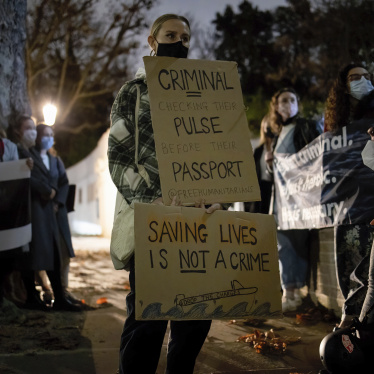Human Rights Watch researchers at the border between Ingushetia and Chechnya have learned that as many as 40,000 internally displaced persons are stranded on the Chechen side of the frontier, prevented by Russian troops from crossing to safety.
According to Ruslan Maskurov, the vice premiere of Ingushetia, Russian federal forces "do not permit anyone, including doctors or nurses," to access the displaced persons column. "We cannot do anything for those stuck on the Chechen side of the border," Maskurov told Human Rights Watch.
Some 200,000 Chechens have already fled to Ingushetia, placing a heavy strain on the tiny republic's indigenous population of 347,000. Ingush authorities have protested the border closure, saying they are willing to provide a safe haven for Chechnya's noncombatant population.
The head of the line of displaced persons is three miles from the nearest Ingush border post. Russian commanders argue that the threat of infiltration and terrorism requires that they rigorously screen Chechen civilians seeking to leave the embattled republic. According to Chechens who have been through the process, the federal authorities have erected a complex security screening procedure: officials check the record of each individual through a computerized databank, search their baggage, and question them vigorously. This cumbersome apparatus is unable to quickly process the flow of displaced Chechens.
Officials at the border have stated that 153 persons crossed into Ingushetia on November 1, followed by 423 people on Nov 2. The figure for November 3 at 5 p.m. was 1026, an encouraging increase that may have been prompted by a flurry of official border visits by United Nations representatives and Russian federal authorities. As long as the cumbersome screening procedure remains in effect, however, the column of displaced civilians is likely to grow.
Despite mounting domestic and international attention, Russian forces refuse to grant journalists access to the column of displaced persons. Ingush officials, relief workers, and medical personnel are also denied access, complicating attempts to provide a minimum of basic care. Several civilians have already died in the column, reportedly as a result of heart failure.
A senior Ingush police officer told Human Rights Watch that the authorities are sending bread and water across the border, but said he was unable to verify if the supplies were reaching the intended beneficiaries. "We have no access and thus have no idea if we are helping," he said.
The Russian military should allow immediate and unimpeded access to the column of displaced persons by Ingush authorities, relief agencies, human rights monitors, and the media. By placing tens of thousands of civilians in effective quarantine, Russian forces are violating their international obligations to protect civilians. Non-combatants fleeing the bombing should have free access to Ingushetia.








